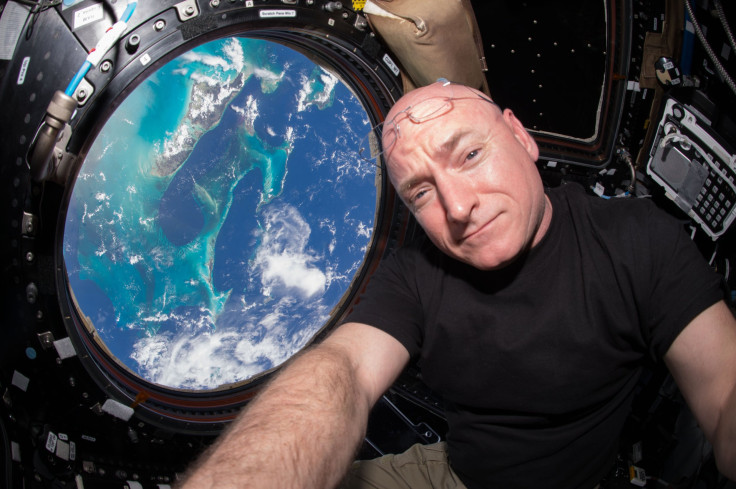NASA Astronaut Scott Kelly Gets Ready To Adjust To Life With Gravity After A Year In Space

Scott Kelly has boldly gone where no NASA astronaut has gone before: He has spent 334 days in space, a feat accomplished by only a handful of Russian cosmonauts.
With his return to Earth on a Russian Soyuz spacecraft scheduled for Tuesday, Kelly will have to prepare for something he hasn't experienced in close to a year: gravity. Kelly's health and body have changed during his time aboard the International Space Station, and he will need to adjust to doing daily tasks on Earth such as eating, sleeping and even drinking coffee.
"Even after a year, you don't feel perfectly normal," Kelly said in a news conference aboard the space station Thursday. "It's not necessarily uncomfortable, but it is a harsh environment. Without any running water, it's like I've been camping in the woods for a year."
#Countdown 96 #sunsets or 6 days and a wake-up! #GoodNight from @space_station! #YearInSpace pic.twitter.com/12ILkbrbBU
— Scott Kelly (@StationCDRKelly) February 25, 2016
The environment aboard the space station puts a huge stress on the body, and returning astronauts face challenges such as decreased bone density, muscle loss, eye degeneration, sleep quality and heart health. Astronauts aboard the space station have to exercise for more than two hours each day to maintain muscle mass and bone density.
What's more, Kelly, along with the other astronauts in space, have been exposed to radiation. For a comparison, NASA estimates it would take 5,250 trips between Los Angeles and New York aboard an airplane to get the same radiation exposure as Kelly has been exposed to during his yearlong mission.
Kelly said his biggest challenge was psychological, the prolonged isolation of living in space.
The reason Kelly is of particular interest to NASA is that he has an identical twin brother, retired NASA astronaut Mark Kelly, and researchers plan to study the impact of a year in space on a genetic level by comparing the two siblings. Such comparisons are expected to yield insights useful for future space station missions and, ultimately, a manned mission to Mars.
#YearInSpace #Countdown Day 9 down. #Throwback to when I dared watch #Gravity on @space_station. That was cool! pic.twitter.com/lX6Wfo4zWT
— Scott Kelly (@StationCDRKelly) February 23, 2016
NASA crafted 10 studies dedicated to the twins ranging from the effects of microgravity on different organs, including visual impairment and plaque buildup in the arteries. Tests include measurements for cognitive ability, gut bacteria differences, changes in the immune system and proteins in the body. These studies are in addition to the 400 investigations Kelly participated in aboard the space station like growing vegetables and flowers in microgravity.
Russian cosmonaut Mikhail Kornienko launched with Kelly in March 2015, and researchers can also compare the changes experienced by the astronauts.
Before leaving to the space station, Kornienko said he asked Vladimir Titov, a retired cosmonaut who spent a year in space in 1988, about what to expect after the mission. "I asked him if it was difficult to fly for a year, and he said, 'Yes, it takes its toll, but we could walk on our own when we came back.' They gained weight when they came back, and that gave me a great boost," Kornienko said in a January 2015 interview.
As soon as Kelly returns to Earth next week, Kelly will undergo several hours of medical exams and physicals in Houston. A field test after the astronauts return will measure the time it takes for them to perform simple tasks. The test will include seeing how long it takes to stand up, walking to a door and correcting balance while walking. Upon arrival, most astronauts need some assistance in walking properly.
Blood, urine, saliva and fecal samples will be collected for another year. The data collected from the Kelly twins and Kornienko will yield scientific results for years. Kelly will undergo an adjustment phase when he returns to Earth. Kelly's exercise regime will continue while additional functional task tests will be conducted at NASA's Johnson Space Center.
Needed a little humor to lighten up a #YearInSpace. Go big, or go home. I think I'll do both. #SpaceApehttps://t.co/Ift8VdDR4C
— Scott Kelly (@StationCDRKelly) February 23, 2016
In addition to all the physical tests, eating and sleeping will also be very different for Kelly. The astronauts have not taken an actual walk in over 300 days or used a cup for their morning coffee. The lack of gravity also affects how astronauts sleep.
Feeling the breeze, looking at the night sky from below and breathing fresh air are a few of the things Kelly has been missing. "I look forward to fresh food, like a salad, believe it or not," Kelly said during an in-flight interview recorded Jan. 28. "I look forward to sitting at a table, relaxing and just having a meal with friends and family when you don't have to worry about your spoon, fork or food floating away."
© Copyright IBTimes 2024. All rights reserved.






















